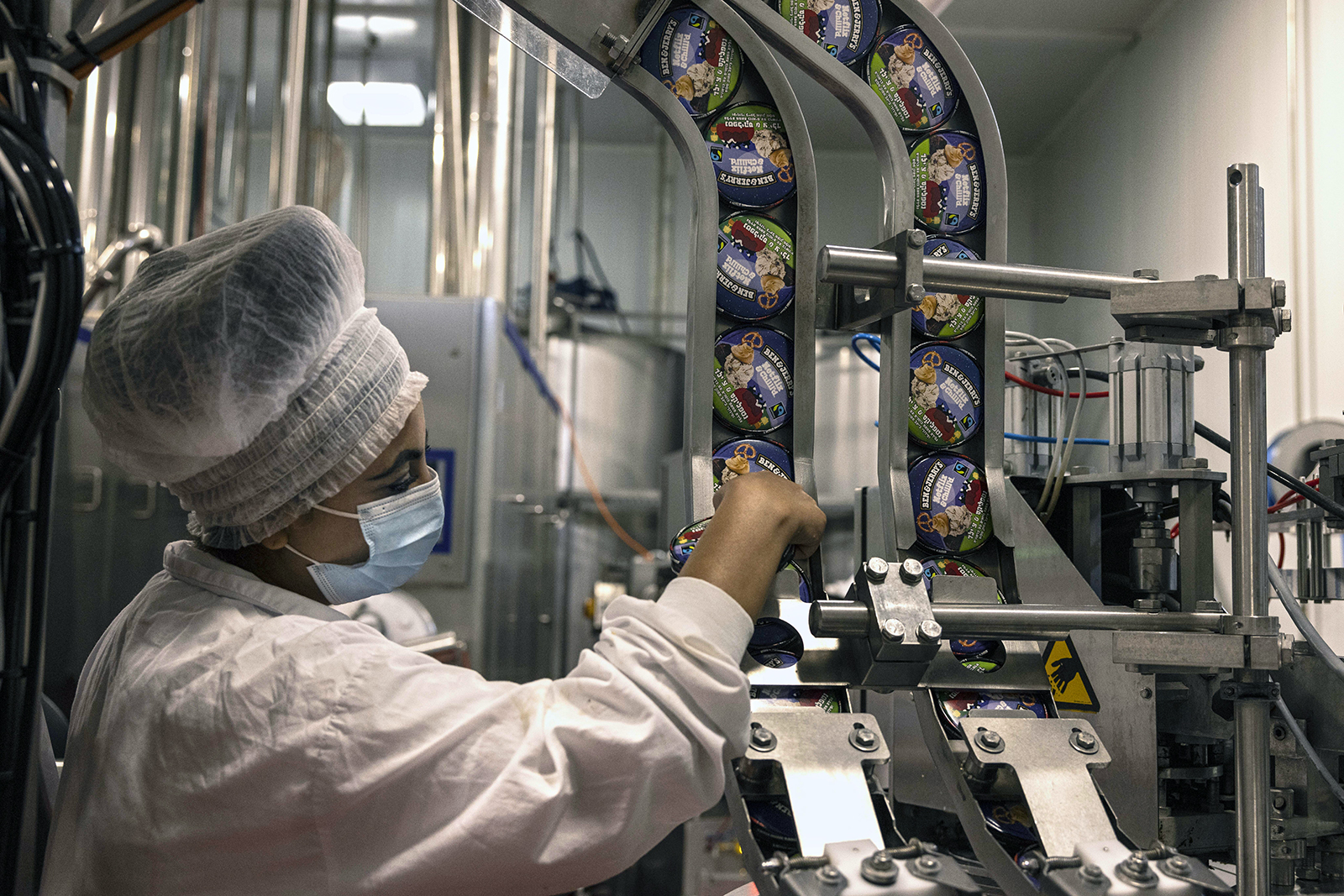
An Israeli works at the Ben & Jerry’s ice-cream factory in the Be’er Tuvia Industrial area, July 20, 2021. Ben & Jerry’s decided to stop selling its ice cream in the Israeli-occupied West Bank and contested east Jerusalem. (AP Photo/Tsafrir Abayov)
(RNS) — After Ben & Jerry’s announced it was “inconsistent with our values” to keep selling their ice cream in Israel’s occupied West Bank territories last month, the Israeli political leadership went a little nuts.
President Herzog characterized the decision as “a new type of terrorism.” Calling it a “clearly anti-Israel step,” President Naftali Bennett warned of “serious consequences.”
Let us note that back in 2013 McDonald’s decided not to operate in the West Bank. Bennett, then head of the Jewish Home Party, said he’d be the first to buy a burger from a competitor, but that’s about it. Since then, McDonald’s has continued to operate some 180 franchises throughout Israel proper without consequences, serious or otherwise.
RELATED: Ben & Jerry’s threatened ban in West Bank creates ripples beyond ice cream stores
Perhaps that’s because the company didn’t announce its decision with a declaration of principle. Maybe also because Ben and Jerry’s founders Bennett Cohen and Jerry Greenfield are iconic Jews, and maintaining discipline within your tribe is more important than policing outsiders.
Be that as it may, the American Jewish establishment was not slow to fall into line — and that included those parts of the establishment that have been less than supportive of the pro-settlement policy of the Israeli government in recent years.
For example, the ADL issued a statement that said in part, “While ADL is a strong supporter of the two-state solution, we believe that it is wrong for any company to single out Israel by refusing to sell its products to Israelis and Palestinians living in the West Bank.”
After Cohen and Greenfield published an op-ed in The New York Times to explain that the company’s decision was a criticism of Israeli policy and not an endorsement of boycotting, divesting from or sanctioning Israel (aka BDS), the American Jewish Committee’s top lawyer, my old friend Marc Stern, wrote in a letter to the editor, “Tagging one side with all responsibility for the Israeli-Palestinian conflict may make self-described social justice advocates proud, but it advances neither peace nor justice.”
Indeed, the AJC went so far as to help 30 Ben and Jerry’s franchisees write a letter asking Unilever, the company’s corporate owner, to reverse the West Bank decision. (No indication, however, of the AJC working with McDonald’s franchisees on a comparable missive.)
Even J Street, the dovish lobby considered trayf by other pro-Israel organizations, was notably circumspect. In a statement, it criticized Ben and Jerry’s critics without itself supporting the company’s action.

A “Thank You Ben & Jerry” letter published in the Israeli newspaper Haaretz, July 27, 2021, from 90 leading Israeli liberals supporting Ben & Jerry’s decision to stop selling their ice cream in the occupied territories. Courtesy image
These reactions stood in notable contrast to a “Thank You Ben & Jerry” letter published in the Israeli newspaper Haaretz that was signed by 90 prominent Israeli liberals, including political notables like former Speaker of the Knesset Abvaham Burg and former Attorney General Michael Ben-Yair, and leading academics like Sarah Stroumsa, former rector of the Hebrew University, and her husband Guy, Martin Buber Professor Emeritus of Comparative Religion at the Hebrew University as well as the first professor of the study of the Abrahamic religions at Oxford.
Guy, whom I’ve known since we were graduate students nearly half a century ago, said in an email that he signed the letter to “express agreement with a decision that objects to more than 50 years of occupation of a large Palestinian population which remains deprived of any political rights and of many human rights (while Jewish settlers in the same territories retain all their rights as Israeli citizens), with no end in sight, and no real, significant effort to seek a fair solution — all this, without boycotting Israel itself, BDS style, which too often crosses the border between opposition to Israel’s policy and an ‘Anti-Zionism’ which is Anti-Semitism in (thin) disguise.”
Then there’s my recently retired colleague Ron Kiener, a Jewish studies professor who taught the Israeli-Arab conflict for decades. In a 2014 blog post, he laid out his own approach to the West Bank, which includes vigorous opposition to academic boycotts of institutions of higher learning in Israel proper but a refusal to have anything to do with the university in the settlement city of Ariel.
RELATED: Why the Ben & Jerry’s meltdown?
“The settlement project has been a cancer eating at the Zionist enterprise,” Kiener said in a phone conversation. “The first thing I did when I heard about Ben and Jerry’s was go out and buy two pints.”
Most American Jews do not embrace the Israeli settlement policy. According to a 2019 AJC survey, 41% support dismantling some of the settlements and an additional 25% support dismantling all of them. The question is why such support shouldn’t extend to the kind of economic renunciations made by McDonald’s and Ben and Jerry’s.
The Zionist enterprise may require it.





